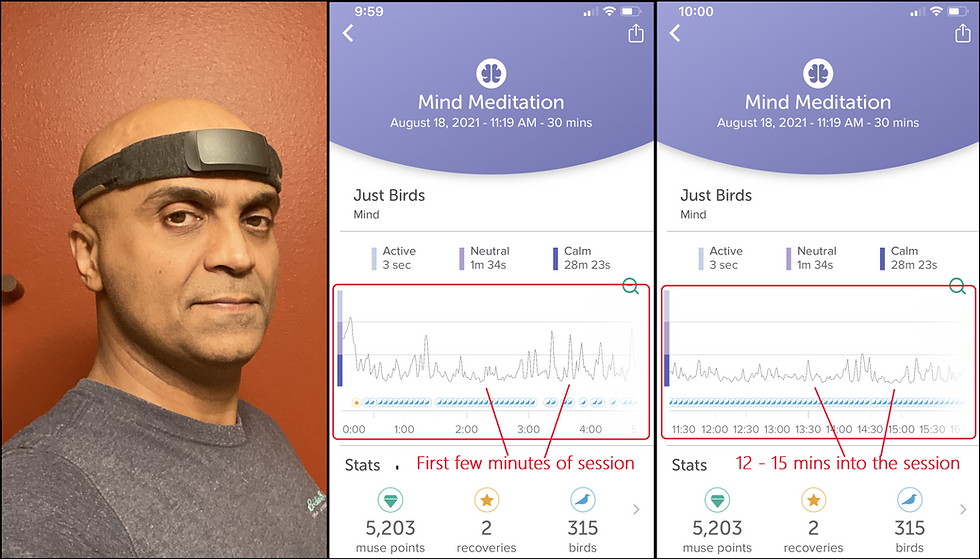Takeaways from my Google-sponsored ticket to the “Wisdom 2.0: Mindfulness in a World on Fire” Event
- Kris Shankar
- Nov 13, 2022
- 4 min read

As a Noogler, one of the cool things I’ve stumbled across at Google is its internal gPause program which offers secular mindfulness activities, resources and community for Googlers and teams. This Sunday, I took advantage of a Google-sponsored pass to virtually attend the event “Wisdom 2.0: Mindfulness in a World on Fire” headlined by Jon Kabat-Zinn (“JKZ”) of the Center for Mindfulness at the U Mass Medical School and CNN’s Anderson Cooper.
The theme of the day was how to respond effectively and act meaningfully in response to stress and anxiety in our lives — both at the level of our individual lives and as a result of global crises like climate change, social media and societal polarization.
The recent wave of layoffs in the tech industry underline that even those of us who are privileged to work at companies like Google are not immune to life-changing and stressful events. Here are some of the things that resonated with me and my takeaways from the day’s sessions.
Mindfulness and Social Media
JKZ: Digital devices and social media are creating groups of outrage, where we lose touch with reality and live in a world of our own stories. For instance, the genocide in Myanmar was fanned by social media, they wouldn’t shut it down despite our pleas.
Anderson Cooper: I find meditation helpful in stepping back from the stories that our minds keep playing to us. You can change the stories that you tell yourself.
JKZ: It is the attachment to our stories that is dangerous. When you meditate, you develop the ability to watch the stories arise and pass away without attachment.
My Takeaways: We tell ourselves stories all the time — when we worry about our children, get worked up about people and interactions at work, about homeless people, immigrants, the state of the world. In my own experience, a mindfulness practice (when kept up regularly!) helps break out of the never-ending loop of internal chatter and focus instead on meaningful action.
Technology and Addiction
Audience Member: I love watching the news on CNN. But why can’t CNN stories be more positive and less anxiety inducing?
Anderson Cooper: You won’t watch the positive stories. Humans are wired to have a negativity bias…. JKZ (interrupting): CNN is a for-profit corporation. People get paid enormous salaries to develop tech and algorithms to make you click. So, CNN won’t change. Can we change and watch less CNN? Or bring more mindfulness to watching CNN?
My Takeaways: Our brain chemistry (dopamine receptors,…) is wired to reach for get us to reach for our mobile phones, to read Elon Musk’s latest tweet, to binge-watch Game of Thrones. While we all know this intuitively, we can get a real appreciation for this problem only with a complete and prolonged media detox, possibly through a multi-day mindfulness retreat.
Mindfulness and Corporate Responsibility
Anderson Cooper: In a world on fire, what is the place for mindfulness?
JKZ: In many regards, we are better off than ever before — health indicators like lifespan and infant mortality, levels of education, nutrition — are more positive today than in the past. However, the new factors are Climate Change, and Societal Polarization brought about by technology — here, the train is heading off the cliff.
The crazier the world is, the world needs more silence, stillness. We need to develop greater mindfulness about the impact of our actions on the planet and on society.
My Takeaways: Corporations can play a much bigger role here. Companies are not immune to these changes and have a responsibility to society, shareholders and employees. Executive stock options are not going to be worth a whole lot if we fail to meet the 1.5°C global warming threshold set by the IPCC or if we face a second civil war in the US.
Of course, change starts with the individual and will not happen overnight — mindfulness programs for corporate executives, like the Search Inside Yourself program spawned at Google and spun off as a stand-alone entity, can be a starting point. Only with senior executives envisioning a more meaningful role for their company can we start the transformation of corporate culture and bring about the needed change.
As Rich Fernandez, CEO, SIY, put it: You need to envision your pathway in a world on fire. What you see with your mind’s eye exists.
Being Your Authentic Self
Melissa Carter, Head of Mindfulness Education and Programs at NYU, spoke about the challenges of growing up as a black girl and woman, finding early outer success as a Top 30 under 30 music executive, and then getting fired by the label she worked for. Loneliness was her companion for much of her life from childhood.
As she puts it, the modern world is designed to make us feel lonely and like we don’t belong. It was by sitting with her own loneliness and her mindfulness practice that she eventually found her ground. As she puts it, “You being you is enough and can be the inspiration for someone else to be the same.”
My Takeaways: We often succumb to the pressure to be who we are not. Especially in the corporate world, our self-worth is often measured by job titles, by our last paycheck, bonus or performance review.
Finding one’s authentic self can be a long and difficult journey. Mindfulness can help us live more comfortably in our own skins, and as managers and co-workers, to better appreciate the unique contributions of each individual we work with.




Comments